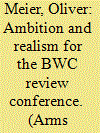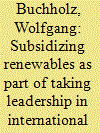| Srl | Item |
| 1 |
ID:
108622


|
|
|
|
|
| Publication |
2011.
|
| Summary/Abstract |
Paul van den IJssel, the Dutch ambassador to the Conference on Disarmament, is president-designate of the 2011 Biological Weapons Convention (BWC) Review Conference, which is scheduled to take place December 5 to 22. He is a career diplomat in the Dutch Ministry of Foreign Affairs.
Van den IJssel spoke with Arms Control Today by telephone from Geneva on September 30 about the upcoming review conference. He said he was seeing a "convergence of views" on many of the key issues, but emphasized that there still is much work to be done to close the remaining divisions on technical and political issues.
|
|
|
|
|
|
|
|
|
|
|
|
|
|
|
|
| 2 |
ID:
179708


|
|
|
|
|
| Summary/Abstract |
This paper investigates whether the EU's governance framework facilitates an ambitious transition to renewable energy sources (RES) in the EU and its Member States. First, we propose a comprehensive concept of ambition based on targets, target achievement and enforcement procedure. Second, we analyze empirical evidence regarding these aspects for RES policy in the EU. In particular, Member States' progress towards the 2020 RES targets suggests a modest effect of the EU governance framework on national RES ambitions. Instead, national RES expansion trajectories seem to be strongly path-dependent. Meanwhile, frontrunner Member States' over-achievements enable the EU to close in on its 2020 target.
|
|
|
|
|
|
|
|
|
|
|
|
|
|
|
|
| 3 |
ID:
180142


|
|
|
|
|
| Summary/Abstract |
In 2016 and as part of its commitment under the 2015 Paris Agreement, China submitted its First Nationally Determined Contribution (NDC), outlining its ‘best efforts’ to limit greenhouse gas emissions. In 2017, the country accounted for 26% of global carbon emissions, stemming mostly from coal-based electricity generation and mining. The United States, by comparison, accounted for nearly 14%, and the European Union, almost 10%. In view of this disparity and the significance of China's contribution to achieving global emissions targets and sustainability, we revisit its First NDC. We argue that, while China is set to meet its non-fossil fuel targets, progress on its fossil fuel targets is stymied by continual coal development, which has negative implications for the Paris 2 °C limit. We contend that the country's focus on carbon-intensive economic expansion is a major barrier to greater climate ambition, especially when considering its growing portfolio of overseas investments in fossil fuel-dependent sectors. In bringing together disparate arguments from across the energy policy literature and looking ahead to its Second NDC, we conclude by making four recommendations for increasing China's climate ambition and centering a just transition to clean energy.
|
|
|
|
|
|
|
|
|
|
|
|
|
|
|
|
| 4 |
ID:
166575


|
|
|
|
|
| Summary/Abstract |
Leadership in Climate Policy is usually associated with leading by example in mitigation efforts whereas little attention has been paid to leadership in climate-friendly technological progress. We point out that pioneering activities that create reliable demand such as Germany's feed-in tariff for solar energy constitute such technological leadership. Based on global learning curves, we argue that the enormous reduction of prices for photovoltaic modules is due to demand side interventions like Germany's EEG and related international technology diffusion and policy transfer, especially to China. For the German case, we calculate that the costs of incentivizing this technological progress through the EEG add up to a range between 112.34 and 122.18 Bn Euro (based on a thought experiment of a hypothetical new entrant in 2014).
|
|
|
|
|
|
|
|
|
|
|
|
|
|
|
|